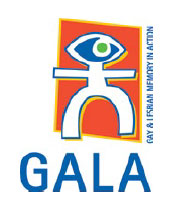 GALA is one of the world’s foremost research destinations for those interested in the study, promotion and preservation of the history and contemporary experience of lesbian, gay, bisexual, transgender and intersex (LGBTI) people in Africa. GALA has used its base at the University of Witwatersrand, where its archival collections, programmes and staff contingent are located, to become a hub of intellectual activities in South Africa and around the world.
GALA is one of the world’s foremost research destinations for those interested in the study, promotion and preservation of the history and contemporary experience of lesbian, gay, bisexual, transgender and intersex (LGBTI) people in Africa. GALA has used its base at the University of Witwatersrand, where its archival collections, programmes and staff contingent are located, to become a hub of intellectual activities in South Africa and around the world.
Originally known as The Gay and Lesbian Archives, the core of the organization is a unique archive of LGBTI materials. These collections are fundamental to GALA’s work and to that of many scholars and organizations. Around this core revolves an exciting range of programmes and activities that aim to educate the public, create dialogue on same-sex sexuality and gender identity, build community amongst LGBTI people, and inspire action. These include the mainstreaming of relevant exhibitions into museums; the promotion of seminars, workshops and other events; undertaking social research that supports advocacy; the production of relevant publications; documentary films; community theatre productions; queer historical tours; and other outreach initiatives.
GALA was founded on and maintains a strong human rights agenda. In addition to the activities listed above, this has also found expression in work aimed at educators and in-school youth, and an innovative deaf programme focused on intersecting issues of LGBTI rights, HIV and AIDS and the human rights of deaf people.
Originally GALA focused on struggles for justice within the LGBTI South African context but more recently our work has begun to document these struggles in the broader Africa context. For more information visit: GALA
 Beverly Ditsie
Beverly Ditsie
Bev was born in Soweto in 1972, and grew up a tomboy. She was at the first meeting of the Gay and Lesbian Organization of the Witwatersrand (GLOW) at age 17. There she met Simon Nkoli, just recently acquitted on charges of treason, and became inspired by his leadership. At the first Pride March in 1990, Simon made a speech that had a huge impact on Bev. He said that his oppression was two-fold, first as a homosexual and then as black.Bev identified with Simon when he said this, but for many black lesbian women the gender oppression makes it three-fold. Bev’s example as an out activist inspired many black lesbians in the township to come out. This is reflected within the archive, where many coming-out stories from that time begin with, “When I saw Bev on TV…” After coming out on TV after the first pride march in 1990, Ditsie was threatened, felt she was in danger and could not leave her house for weeks. In 1995 Bev became the first lesbian to address the United Nations on lesbian issues at the World Conference on Women in Beijing.In 1995 Bev left GLOW because she was frustrated that men dominated its leadership and did not take lesbian issues seriously. She then started an organization called Nkateko in 1996 for black lesbians only. Meeting at Bev’s home, it created an important space for black lesbians from Soweto, Kwa-Thema and Sebokeng.Commenting on Bev Ditsie’s 16th birthday party Paul Mokgethi said: “We would meet once a month, and always celebrate birthdays. Birthdays were a big thing! Bev’s 16th birthday party was a big coming out for all of us!”
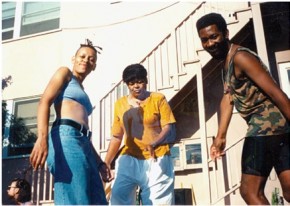 |
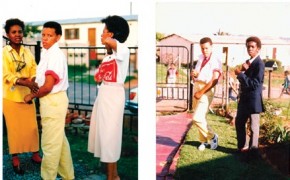 |
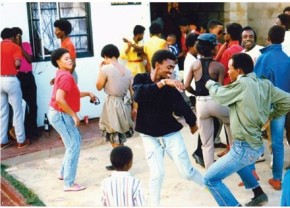 |
Leonard Christian Du Plooy (Granny Lee)
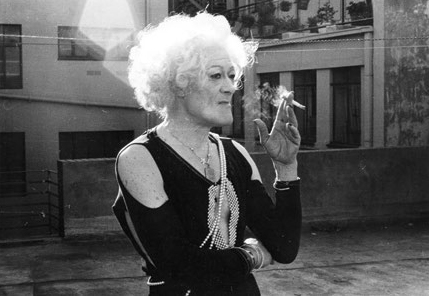 Leonard Christian Du Plooy was born on the 18th of March 1919 to a mixed race (“coloured”) working class family. In many ways he embodied all the contradictions of a country ruled by racism and hypocrisy. The first part of his adult life was spent in his hometown of Kimberley teaching at the Christian Brothers College and later as a teacher in Durban. He then changed his mind (and his skin colour). In his fifties, he moved to Johannesburg and proceeded to become the city’s most famous club-goer, drag queen and granny.
Leonard Christian Du Plooy was born on the 18th of March 1919 to a mixed race (“coloured”) working class family. In many ways he embodied all the contradictions of a country ruled by racism and hypocrisy. The first part of his adult life was spent in his hometown of Kimberley teaching at the Christian Brothers College and later as a teacher in Durban. He then changed his mind (and his skin colour). In his fifties, he moved to Johannesburg and proceeded to become the city’s most famous club-goer, drag queen and granny.
 Due to a skin condition he was now able to pass himself off as white and continued to live life as a white woman, which held many advantages in Apartheid South Africa. By outfitting himself with outrageous costumes, feather boas, heavy makeup and a retinue of young admirers, the pensioner transformed himself and became “Granny Lee,” Queen of the Discos. Lee passed away at the age of 81 in 1989, and in death continued to flaunt the rules mistakenly he became the first person of colour to be buried in Johannesburg’s Westpark cemetery.
Due to a skin condition he was now able to pass himself off as white and continued to live life as a white woman, which held many advantages in Apartheid South Africa. By outfitting himself with outrageous costumes, feather boas, heavy makeup and a retinue of young admirers, the pensioner transformed himself and became “Granny Lee,” Queen of the Discos. Lee passed away at the age of 81 in 1989, and in death continued to flaunt the rules mistakenly he became the first person of colour to be buried in Johannesburg’s Westpark cemetery.
 |
 |
Granny Lee Quotes:
“I’m not one of these people that want to shine like common brass in sunlight.”
“I have never yet been called Mister in the twenty years in this city. Nowhere. And the world knows it. They call me Madam, Missus, Granny, whatever in shops. Not Mister. And my success is only this because I don’t jump in mens’ clothes in the morning.”
“I been handling humanity all my life. I know people. Nothing frightens me. You should know that. Who frightens me in the pubs? Any of these whores? They wouldn’t dare.”“So I don’t smoke. I consider myself a lady. I got to carry it right through.”
“I go to straight bars and I find a good man. That’s my racket. That’s my success of living darling. I don’t shit on my doorstep.”
“The reason why I never will have a sex change… for the simple reason I’m a very holy type of person. People may not think so but I am. I’ve been brought up that way. I don’t think I will be accepted with a plastic body in the new hemisphere wherever it is. That’s my belief. That’s why I keep my body as I was born. The other reason is this. If a man wanted a fish he’d go to real fish.”
“I never starve of sex. I have it every day. And the best.” “I’ve blossomed from the day I was born.”
- Migrating Archives: Participating Archives
- Adarna Food and Culture Restaurant
- The Australian Lesbian and Gay Archives
- The Fonds Suzan Daniel
- GALA
- Gay, Lesbian, Bisexual Transgender Historical Society
- Glasgow Women’s Library
- Hall-Carpenter Archives
- Il Cassero and Centro di Documentazione
- Labrisz Lesbian Association
- The Leslie Lohman Museum
- The National Archives
- rukus!
- Virginia Commonwealth University Libraries